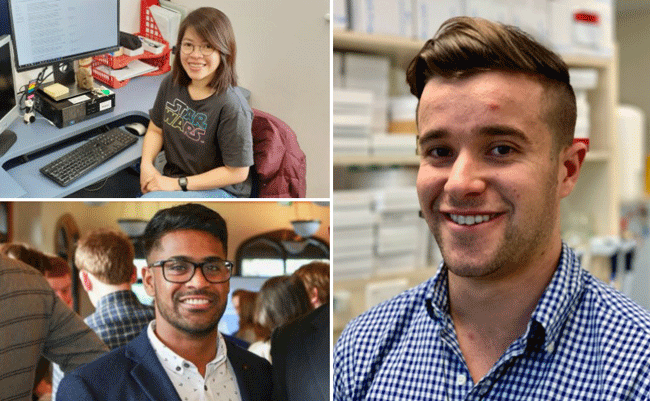Wednesday 4 September 2019 12:43pm

Otago researchers (clockwise, from top left) Mylene Anwar, Tom Devine and David Nair will compete in Falling Walls Lab New Zealand next Tuesday.
Three Otago researchers are set to compete in Falling Walls Lab New Zealand this month.
Falling Walls challenges participants to present a three-minute pitch of their innovative research project, business model or social initiative relevant to the world today.
Otago researchers Mylene Anwar, Tom Devine and David Nair will compete in Auckland next Tuesday, 10 September. They will face off against 17 other researchers from universities and research institutes across New Zealand and the Pacific.
The event is inspired by the world-changing event of the fall of the Berlin Wall on 9 November 1989, with the question at every Falling Walls gathering - which walls will fall next?
"Along with its use for improving gut health, this research initiative can be a three-edged sword that can simultaneously address issues on underutilisation of resources, poverty and agro-waste management."
Ms Anwar’s topic is Breaking the Wall of Poor Gut Health - she is currently undertaking her doctoral research into the prebiotic effect and immunomodulatory activity of taro in combatting intestinal diseases such as necrotising enterocolitis, in the Food Science Department at Otago.
Her research was inspired by the use of taro by indigenous peoples in her home country of The Philippines.
“Along with its use for improving gut health, this research initiative can be a three-edged sword that can simultaneously address issues on underutilisation of resources, poverty and agro-waste management.
“This can be immensely useful for African and Asian countries and the Pacific Islands, the major producers of taro globally, and the same countries that are greatly affected with poor gut health.”
Ms Anwar says she is humbled to be able to present her research in the competition because harnessing the symbiotic effect of prebiotics and probiotics is her way of breaking the wall of poor gut health, a global health issue.
"My research attempts to combine innovative scientific technologies with culturally appropriate strategies that take into the account the colonial history and ongoing subjugation of Māori people."
Working as an Assistant Research Fellow in the Department of Microbiology and Immunology, Mr Devine is Breaking the Wall of Indigenous Inequality with his research into tuberculosis in the Māori population.
“For too long Māori have been failed by the healthcare system. Especially in science there is the attitude that interventions must be based solely on facts.
“My research attempts to combine innovative scientific technologies with culturally appropriate strategies that take into the account the colonial history and ongoing subjugation of Māori people.”
He was inspired to do his research because he wanted to implement “actual change” rather than relying on modelling.
“Falling Walls is about breaking down barriers and improving our society. I’m absolutely honoured to be selected to speak. It is the perfect opportunity to give indigenous people a voice.”
Mr Devine also hopes his model can be applicable to other infectious diseases in New Zealand, especially those of particular relevance to Māori, including acute rheumatic fever, meningococcal disease and skin infections.
"Being involved in this competition is a huge privilege. It provides a great opportunity to share our research with a more diverse population who may have further suggestions or networks in which we can improve our model."
Mr Nair, a Bachelor of Medicine and Bachelor of Surgery student at Otago’s Christchurch campus, has been involved with a Canterbury District Health Board and University project to develop a simulation model for keyhole surgery in the chest of newborn babies.
“This has focused around the condition oesophageal atresia which is a birth defect where a baby is born without part of the oesophagus. Instead of forming a tube between the mouth and stomach, the oesophagus grows into two separate segments which do not connect,” Mr Nair says.
Surgery is required to correct the defect, but the operation is incredibly difficult and the condition is relatively rare so there are limited opportunities for surgeons to develop the necessary skills to perform the operation, he says.
Mr Nair’s involvement in the research project was based on his keen interest in paediatric surgery and simulation-based education relating to surgery, which the project has given him ample exposure to as well as introducing him to mentors.
He hopes the development of the simulator will not only help with the training of surgeons but also ultimately improve patient safety and outcomes from this complicated operation.
“Being involved in this competition is a huge privilege. It provides a great opportunity to share our research with a more diverse population who may have further suggestions or networks in which we can improve our model.
“It’s also very exciting to be able to hear from other future researchers who are passionate about what they are working on.”
The most intriguing presentation at the Auckland competition will be selected to represent New Zealand and travel to the Falling Walls Lab Finale Berlin, Germany on 8 November.
At the Berlin Lab, 100 finalists receive the opportunity to present their work in front of a distinguished jury and attend the Falling Walls Conference on 9 November, where they get to meet the world’s top scientists.
